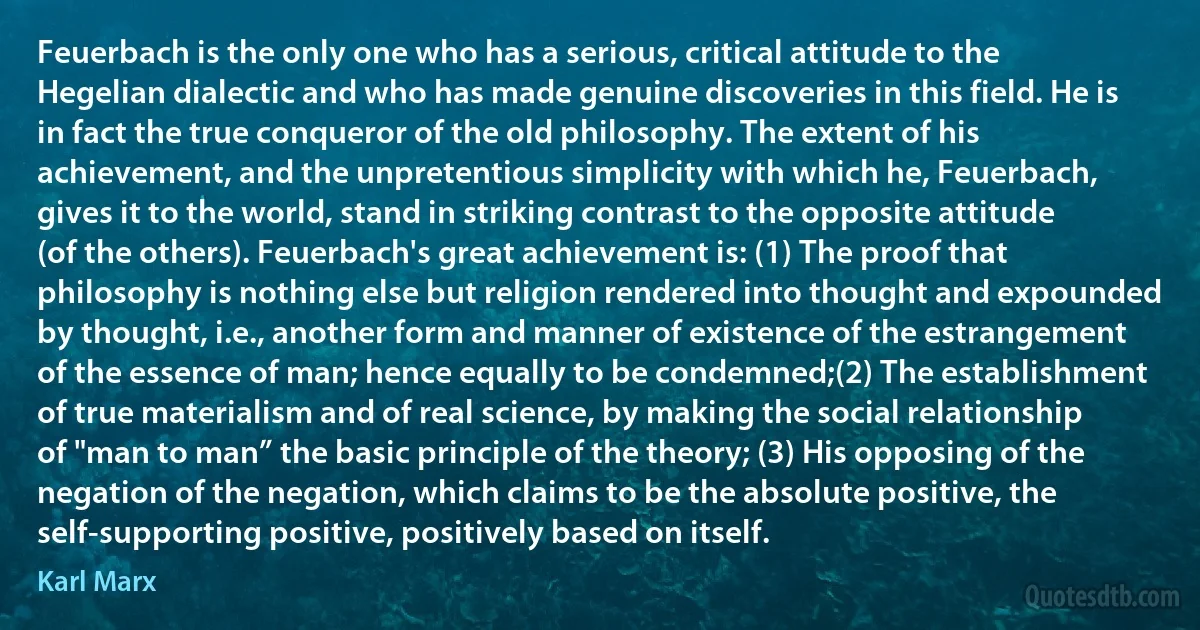
Feuerbach is the only one who has a serious, critical attitude to the Hegelian dialectic and who has made genuine discoveries in this field. He is in fact the true conqueror of the old philosophy. The extent of his achievement, and the unpretentious simplicity with which he, Feuerbach, gives it to the world, stand in striking contrast to the opposite attitude (of the others). Feuerbach's great achievement is: (1) The proof that philosophy is nothing else but religion rendered into thought and expounded by thought, i.e., another form and manner of existence of the estrangement of the essence of man; hence equally to be condemned;(2) The establishment of true materialism and of real science, by making the social relationship of "man to man” the basic principle of the theory; (3) His opposing of the negation of the negation, which claims to be the absolute positive, the self-supporting positive, positively based on itself.
Karl MarxRelated topics
basic contrast dialectic establishment estrangement field form gives great hegelian making man materialism nothing proof real religion science stand thought world othersRelated quotes
Mark at present so much; what the essence of Scandinavian and indeed of all Paganism is: a recognition of the forces of Nature as godlike, stupendous, personal Agencies,-as Gods and Demons. Not inconceivable to us. It is the infant Thought of man opening itself, with awe and wonder, on this ever-stupendous Universe. To me there is in the Norse system something very genuine, very great and manlike. A broad simplicity, rusticity, so very different from the light gracefulness of the old Greek Paganism, distinguishes this Scandinavian System. It is Thought; the genuine Thought of deep, rude, earnest minds, fairly opened to the things about them; a face-to-face and heart-to-heart inspection of the things,-the first characteristic of all good Thought in all times. Not graceful lightness, half-sport, as in the Greek Paganism; a certain homely truthfulness and rustic strength, a great rude sincerity, discloses itself here.

Thomas Carlyle
I think it's already apparent that a good part of this Nation understands - if only instinctively - that anything which seems to suggest that God favors a political party or the establishment of a state church, is wrong and dangerous.
Way down deep the American people are afraid of an entangling relationship between formal religions - or whole bodies of religious belief - and government. Apart from constitutional law and religious doctrine, there is a sense that tells us it's wrong to presume to speak for God or to claim God's sanction of our particular legislation and His rejection of all other positions. Most of us are offended when we see religion being trivialized by its appearance in political throw-away pamphlets.
The American people need no course in philosophy or political science or church history to know that God should not be made into a celestial party chairman.

Mario Cuomo
With the advent of medieval Scholasticism, ... we find a clear distinction between theologia and philosophia. Theology became conscious of its autonomy qua supreme science, which philosophy was emptied of its spiritual exercises, which, from now on, were relegated to Christian mysticism and ethics. Reduced to the rank of a "handmaid of theology,” philosophy's role was henceforth to furnish theology with conceptual-and hence purely theoretical-material. When, in the modern age, philosophy regained its autonomy, it still retained many features inherited from this medieval conception. In particular, it maintained its purely theoretical character, which even evolved in the direction of a more and more thorough systemization. Not until Nietzsche, Bergson, and existentialism does philosophy consciously return to being a concrete attitude, a way of life and of seeing the world.

Pierre Hadot
Take a moment to remember the times on your own spiritual quest when you felt most enthusiastic. We want to pinpoint the times in which we felt more God conscious and devotional than ever before. Conversely, look at the times when you felt unenthused and do a similar analysis. These questions might help stimulate your thought process: Are you enthusiastic about your existence as a servant of the Lord? Are you enthusiastic to follow the basic principles that will help elevate your consciousness? Are you enthusiastic in the association of saintly people? Are you enthusiastic about what you can experience in your purest state? We must examine our spiritual life on a daily, weekly, and even yearly basis. This examination will help us recognize how various activities and thoughts affect us. We should note how the quality of our experiences varies according to our absorption in the process of bhakti.

Bhakti Tirtha Swami
The fundamental maxim of those who stand at the head of this Age, and therefore the principle of the Age, is this,-to accept nothing as really existing or obligatory, but that which they can understand and clearly comprehend. With regard to this fundamental principle, as we have now declared and adopted it without farther definition or limitation, this third Age is precisely similar to that which is to follow it, the fourth, or age of Reason as Science,-and by virtue of this similarity prepares the way for it. Before the tribunal of Science, too, nothing is accepted but the Conceivable. Only in the application of the principle there is this difference between the two Ages,-that the third, which we shall shortly name that of Empty Freedom, makes its fixed and previously acquired conceptions the measure of existence; while the fourth-that of Science-on the contrary, makes existence the measure, not of its acquired, but of its desiderated beliefs.

Johann Gottlieb Fichte
